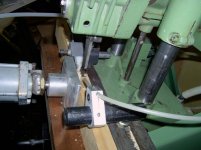hennebury
Plastic
- Joined
- May 27, 2009
- Location
- Ontario, Canada
Hi, So I am rebuilding woodworking machines. I often have old Maka mortisers to rebuild.
The mortising head unit is held in a cast iron unit with two 30mm bores, the unit slides on 30mm round bar. The cast iron bore and the round bar are often galled up, sometimes quite badly. I would like to replace the round bar with a slightly oversized bar and hone the cast iron bore to get a good clean slide.
I don't know what type of material the bar is made from. It doesn't appear to be very hard.
Can anyone shed some light on what would be a suitable replacement round bar for this application.


The mortising head unit is held in a cast iron unit with two 30mm bores, the unit slides on 30mm round bar. The cast iron bore and the round bar are often galled up, sometimes quite badly. I would like to replace the round bar with a slightly oversized bar and hone the cast iron bore to get a good clean slide.
I don't know what type of material the bar is made from. It doesn't appear to be very hard.
Can anyone shed some light on what would be a suitable replacement round bar for this application.






 (agree with comments on cast iron tho)
(agree with comments on cast iron tho)